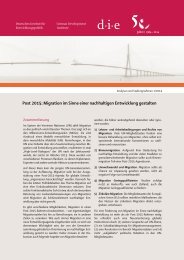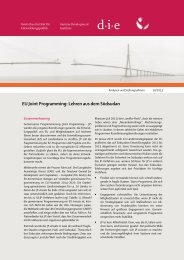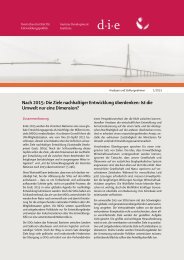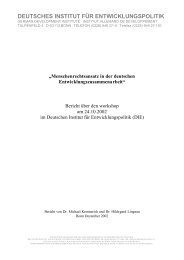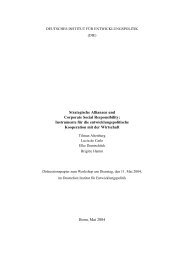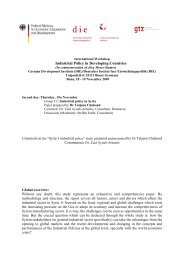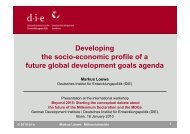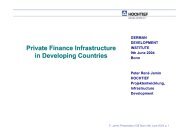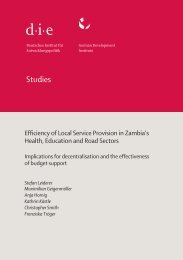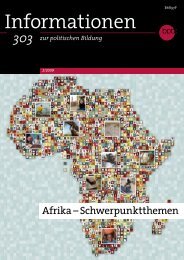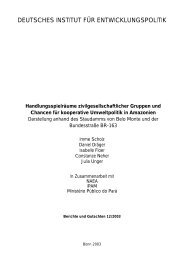Middle East / North Africa and the Millennium Development Goals ...
Middle East / North Africa and the Millennium Development Goals ...
Middle East / North Africa and the Millennium Development Goals ...
You also want an ePaper? Increase the reach of your titles
YUMPU automatically turns print PDFs into web optimized ePapers that Google loves.
144<br />
Markus Loewe<br />
DC should be far more frank <strong>and</strong> assertive in dealing with this issue.<br />
It should clearly admit, <strong>and</strong> own up to, fact that several of <strong>the</strong> measures<br />
it supports have no reference to <strong>the</strong> MDGs. This would create<br />
more transparency, without detriment to <strong>the</strong> matter itself.<br />
However, documenting what German DC in fact contributes to <strong>the</strong> international<br />
goal system would require more than establishing clear-cut links between<br />
<strong>the</strong> PSPs <strong>and</strong> <strong>the</strong> MDG agenda. Since <strong>the</strong> documents in question are<br />
planning papers that are formulated ex ante, <strong>the</strong>y can provide information<br />
only on <strong>the</strong> anticipated (supposed) impacts of German DC. Whe<strong>the</strong>r <strong>the</strong>se<br />
impacts have in fact materialized can only be determined ex post, on <strong>the</strong><br />
basis of appropriate MDG-specific analyses (Neubert 2004).<br />
Although it is entirely feasible to conduct such targeted impact analyses of<br />
German DC’s contributions to implementation of <strong>the</strong> MDG agenda at <strong>the</strong><br />
national level (idem), thus far no systematic analyses have been performed<br />
in any partner country of German DC. The fact that o<strong>the</strong>r donors have not<br />
made much progress here ei<strong>the</strong>r is no excuse. However, at present <strong>the</strong><br />
BMZ’s MDG representative is working toge<strong>the</strong>r with <strong>the</strong> MDG coordinators<br />
of <strong>the</strong> German implementing agencies to “align <strong>the</strong> planning <strong>and</strong><br />
monitoring of development programs <strong>and</strong> measures to <strong>the</strong> MDGs” (Bundesregierung<br />
2004, 5). In this connection <strong>the</strong>re are also plans to align <strong>the</strong><br />
BMZ country concepts <strong>and</strong> priority strategy papers more closely to <strong>the</strong><br />
MDGs with a view to improving <strong>the</strong> poverty relevance of German programs<br />
<strong>and</strong> projects (Bundesregierung 2004, 6).<br />
5.4 Policy dialogue<br />
The German government regularly addresses <strong>the</strong> MDG agenda in <strong>the</strong><br />
framework of its political dialogue with <strong>the</strong> governments of partner countries<br />
in <strong>the</strong> MENA region. However, no efforts are made in that context<br />
what consequences <strong>the</strong> partner country governments might have to face if<br />
<strong>the</strong>ir efforts in implementing <strong>the</strong> MDGs prove inadequate. For <strong>the</strong>ir part,<br />
<strong>the</strong>se partner governments do <strong>the</strong>ir best to avoid addressing <strong>the</strong> issue.<br />
At present <strong>the</strong> BMZ has no guidelines governing whe<strong>the</strong>r <strong>and</strong> in what language<br />
<strong>the</strong> MDG agenda or <strong>the</strong> state of <strong>the</strong> <strong>Millennium</strong> process should be<br />
addressed in government-level consultations <strong>and</strong> negotiations with partner<br />
countries. There is such st<strong>and</strong>ardized official language regarding both <strong>the</strong><br />
German <strong>Development</strong> Institute



